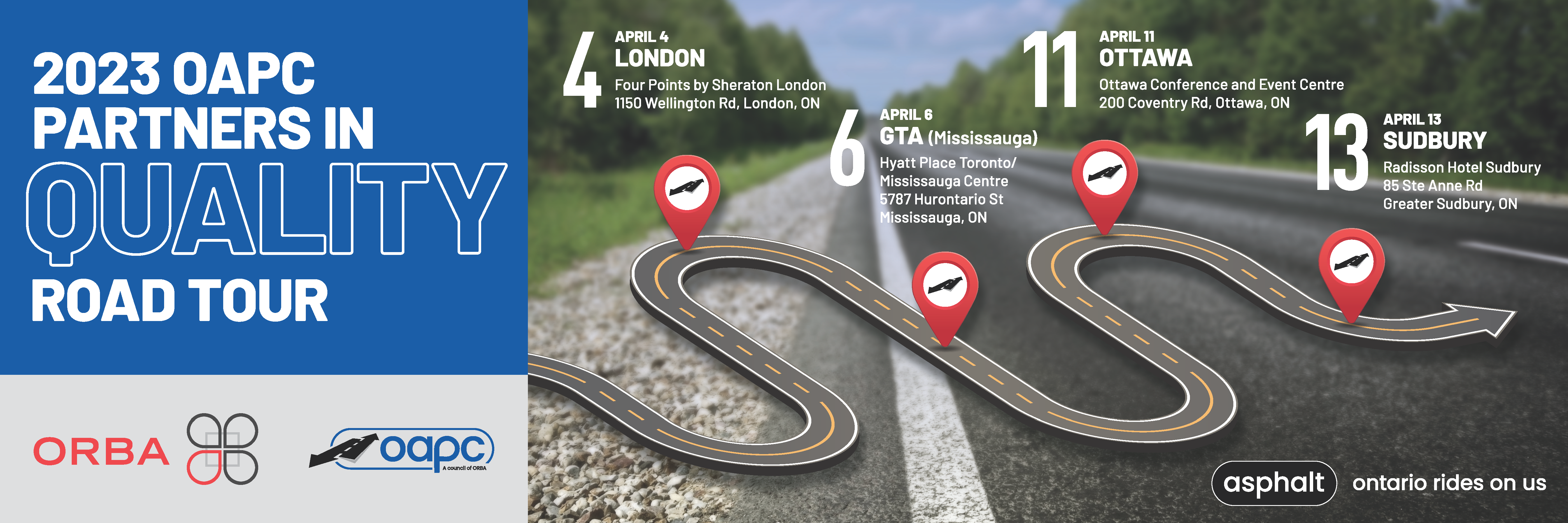
News
Roads & Paving
Sustainable solutions were top of mind at OAPC Partners in Quality Road Tour
April 14, 2023 By Jack Burton

April 6, 2023, MISSISSAUGA, ON – The arrival of spring is many things for Ontarians: a warm relief, the kickoff of construction season, or a reminder of the natural beauty the province has to offer. Heading into the Easter long weekend, preserving this environment dominated many of the conversations featured at the Mississauga installment of the Ontario Asphalt Pavement Council (OAPC)’s Partners in Quality Road Tour.
The event series, which takes place across the province over two weeks with stops in London, the GTA, Ottawa, and Sudbury, serves to connect local producers or contractors with Ministry officials, and highlight the issues they face not only in their region, but in the industry at large.
“The OAPC Partners in Quality Road Tour brings together asphalt producers and industry suppliers with provincial and municipal road owners, to collaborate on our mutual goals: quality roads built with sustainable asphalt pavements,” OAPC’s chair, Peter Hamstra, explained. “It also gives us the opportunity to update our membership on current developments in the asphalt industry, as well as the strategic partnerships we have with a variety of stakeholders.”
Held at the Hyatt Place in Mississauga, the second installment in this year’s series was sponsored by Canadian Asphalt, MCAsphalt, MultiSolv, PNJ Engineering, and Yellowline Asphalt Products.
Following opening remarks from Hamstra, the conference welcomed Joseph Shacat, director of sustainable pavements for the National Asphalt and Pavement Association, visiting Canada for the first time to discuss the impact and benefits of environmental product declarations.
Described as a “nutritional label for your product’s sustainability,” environmental product declarations offer a way for producers to not only have quantified data on the environmental impact of their products, but to save money on bids by meeting and qualifying for “buy clean” legislative incentives.
The head of the Ontario Ministry of Transportation’s bituminous section, Gelu Vasiliu, then discussed several updates and revisions made to provincial policies surrounding roadbuilding and repair, including legislative changes to tack coat policies and infrared joint heater implementation, before discussing research surrounding the implementation of warm mix asphalt.
Incentives and benefits discussed by Vasiliu regarding the usage of warm mix asphalt over hot mix asphalt include reduced greenhouse gas emission, potential savings on the production side due to lowered fuel usage, along with a lowered potential for cracking.
Representing Good Roads, OGRA/MEA’s coordinator of technical programs and research, Amin Mneina, offered a provincial paving forecast based on the organization’s municipal paving survey. The data showed the most common road maintenance in Ontario to be microsealing, crack surfacing, and overlap.
Mneina also highlighted the importance of initial tack coat implementation as a means of reducing the overall costs of projects: while only comprising of around 1.5 per cent of the initial incorporation cost of a road, if improperly implemented, the process involved in fixing tack coat can skyrocket to encompass 30-100 per cent of total paving cost.
ORBA’s own director of technical services, Doubra Ambaiowei, then shared a report he developed in partnership with Carleton University quantifying the usage of asphalt across the industry and its overall impact on the country’s greenhouse gas emissions.
With Canada’s net-zero emissions goal being the year 2050, the transportation industry is reported to be responsible for 25 per cent of the country’s greenhouse gas emissions, with the sector’s total emissions growing 32 per cent between 1990 and 2020.
Sustainable solutions such as the adoption of warm mix asphalt and reclaimed asphalt pavement were recommended by Ambaiowei not only as means of reducing asphalt production’s impact on the country’s total carbon emissions, but for additional benefits for producers including cost savings, increased efficiency, and improved public perception.
This was followed by an update on the Canadian Council of Independent Laboratories, a third-party aggregate testing and training organization, presented by the manager of their certifications programs, Nabil Kamel.
Kamel spoke about the impact that lab certifications can have for contractors, including significant improvements in implementations and a reduction in contract disputes, before discussing how the organization adapted to COVID-19 by developing their own method of remote site inspections and technical certifications.
The conference wrapped up with Ambaiowei returning to the stage to offer an update on ORBA and OAPC’s upcoming events and programs, followed by thanks from Hamstra.
The 2023 series of OAPC’s Partners in Quality Road Tour continued this week, stopping in Ottawa on April 11 before wrapping up in Sudbury on April 13.
Print this page